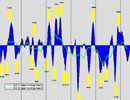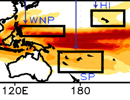NCEP/NCAR Reanalysis, Climatology
- Monthly Longterm Means (Climatology) and Other Derived Variables:
Monthly Longterm Means (Climatology) and Other Derived Variables: Other_Gauss
The NCEP/NCAR Reanalysis 1 project is using a state-of-the-art analysis/forecast system to perform data assimilation using past data from 1948 to the present. A large subset of this data is available from the Physical Sciences Division (PSD) in its original 4 times daily format and as daily averages. However, the data from 1948-1957 is a little different, in the regular (non-Gaussian) gridded data. That data was done at 8 times daily in the model, because the inputs available in that era were available at 3Z, 9Z, 15Z, and 21Z, whereas the 4x daily data has been available at 0Z, 6Z, 12Z, and 18Z. These latter times were forecasted and the combined result for this early era is 8x daily. The local ingestion process took only the 0Z, 6Z, 12Z, and 18Z forecasted values, and thus only those were used to make the daily time series and monthly means here.
These variables are averages of instantaneous values at the 4 reference times; 0,6,12 and 18z over the averaging period (month).
Reference:
Kalnay et al., (1996). The NCEP/NCAR 40-year reanalysis project, Bull. Amer. Meteor. Soc., 77, 437-470
| Variables |
Clear Sky Upward Longwave Flux (W/m^2)
Clear Sky Upward Shortwave Flux (W/m^2) Downward Solar Radiation Flux (W/m^2) Pressure at High Cloud Bottom (Pascals) Pressure at High Cloud Top (Pascals) Pressure at Low Cloud Bottom (Pascals) Pressure at Low Cloud Top (Pascals) Pressure at Middle Cloud Bottom (Pascals) Pressure at Middle Cloud Top (Pascals) Total Cloud Cover at Entire Atmosphere (%) Upward Longwave Radiation Flux (W/m^2) Upward Solar Radiation Flux (W/m^2) |
| Zonal | Global by T62 Gaussian grid |
| Meridional | Global by T62 Gaussian grid |
| Vertical | Nominal top of atmosphere (NTAT) |
| Temporal | Jan 1981 to Dec 2010 (Climatology) by 1 month(s) |
| Static? | no |
| Volume | 1.3MB each |
| Server | public:      |
| Source | http://www.esrl.noaa.gov/psd/data/gridded/data.ncep.reanalysis.derived.otherflux.html |
| Acquired | Feb 7, 2011 (Updated Jan 2014) |
| APDRC contact | |
| Supplements | Readme |
Monthly Longterm Means (Climatology) and Other Derived Variables: Pressure_Level
The NCEP/NCAR Reanalysis 1 project is using a state-of-the-art analysis/forecast system to perform data assimilation using past data from 1948 to the present. A large subset of this data is available from the Physical Sciences Division (PSD) at NOAA in its original 4 times daily format and as daily averages. However, the data from 1948-1957 is a little different, in the regular (non-Gaussian) gridded data. That data was done at 8 times daily in the model, because the inputs available in that era were available at 3Z, 9Z, 15Z, and 21Z, whereas the 4x daily data has been available at 0Z, 6Z, 12Z, and 18Z. These latter times were forecasted and the combined result for this early era is 8x daily. The local ingestion process took only the 0Z, 6Z, 12Z, and 18Z forecasted values, and thus only those were used to make the daily time series and monthly means here.
These variables are averages of instantaneous values at the 4 reference times; 0,6,12 and 18z over the averaging period (month).
Reference:
Kalnay et al., (1996). The NCEP/NCAR 40-year reanalysis project, Bull. Amer. Meteor. Soc., 77, 437-470
| Variables |
Air Temperature (degC)
Geopotential Height (m) Omega (Pascal/s) Potential Temperature (K) Relative Humidity (%) Specific Humidity (g/kg) U-Wind (m/s) V-wind (m/s) Wind Speed (m/s) |
| Zonal | Global by 2.5 deg |
| Meridional | Global by 2.5 deg |
| Vertical | 17 pressure levels (hPa): 1000, 925, 850, 700, 600, 500, 400, 300, 250, 200, 150, 100, 70, 50, 30, 20, 10 (All except Omega (to 100mb), Specific Humidity, and Relative Humidity (to 300mb)) |
| Temporal | Jan 1981 to Dec 2010 (Climatology) by 1 month(s) |
| Static? | no |
| Volume | 13MB (Air Temperature, Geopotential Height, Potential Temperature, U-Wind, V-Wind, Wind Speed) 8.7MB (Omega) 5.8MB (Relative Humidity, Specific Humidity) |
| Server | public:      |
| Source | http://www.esrl.noaa.gov/psd/data/gridded/data.ncep.reanalysis.derived.pressure.html |
| Acquired | Jul 18, 2003 (Updated Jan 2014) |
| APDRC contact | |
| Supplements | Readme |
Monthly Longterm Means (Climatology) and Other Derived Variables: Sigma (Spectral Coefficients)
The NCEP/NCAR Reanalysis 1 project is using a state-of-the-art analysis/forecast system to perform data assimilation using past data from 1948 to the present. A large subset of this data is available from the Physical Sciences Division (PSD) at NOAA in its original 4 times daily format and as daily averages. However, the data from 1948-1957 is a little different, in the regular (non-Gaussian) gridded data. That data was done at 8 times daily in the model, because the inputs available in that era were available at 3Z, 9Z, 15Z, and 21Z, whereas the 4x daily data has been available at 0Z, 6Z, 12Z, and 18Z. These latter times were forecasted and the combined result for this early era is 8x daily. The local ingestion process took only the 0Z, 6Z, 12Z, and 18Z forecasted values, and thus only those were used to make the daily time series and monthly means here.
Reference:
Kalnay et al., (1996). The NCEP/NCAR 40-year reanalysis project, Bull. Amer. Meteor. Soc., 77, 437-470
| Variables |
Divergence (1./s)
Relative Vorticity (1./s) Streamfunction (m*m/s) Velocity Potential (m*m/s) |
| Zonal | Global by T62 Gaussian grid |
| Meridional | Global by T62 Gaussian grid |
| Vertical | 2 Sigma levels: 0.995, 0.2101 |
| Temporal | Jan 1968 to Dec 1996 (Climatology) by 1 month(s) |
| Static? | no |
| Volume | 1.7MB each |
| Server | public:      |
| Source | http://www.esrl.noaa.gov/psd/data/gridded/data.ncep.reanalysis.derived.sigma.html |
| Acquired | Feb 7, 2011 (Updated Jan 2014) |
| APDRC contact | |
| Supplements | Readme |
Monthly Longterm Means (Climatology) and Other Derived Variables: Surface
The NCEP/NCAR Reanalysis 1 project is using a state-of-the-art analysis/forecast system to perform data assimilation using past data from 1948 to the present. A large subset of this data is available from the Physical Sciences Division (PSD) at NOAA in its original 4 times daily format and as daily averages. However, the data from 1948-1957 is a little different, in the regular (non-Gaussian) gridded data. That data was done at 8 times daily in the model, because the inputs available in that era were available at 3Z, 9Z, 15Z, and 21Z, whereas the 4x daily data has been available at 0Z, 6Z, 12Z, and 18Z. These latter times were forecasted and the combined result for this early era is 8x daily. The local ingestion process took only the 0Z, 6Z, 12Z, and 18Z forecasted values, and thus only those were used to make the daily time series and monthly means here.
These variables are averages of instantaneous values at the 4 reference times; 0,6,12 and 18z over the averaging period (month).
Reference:
Kalnay et al., (1996). The NCEP/NCAR 40-year reanalysis project, Bull. Amer. Meteor. Soc., 77, 437-470
| Variables |
Air temperature at sigma level 995 (degK)
Best (4-layer) Lifted Index (degK) Surface Lifted Index (degK) Omega (Pascals/s) Potential temperature at sigma level 995 (degK) Pressure (millibars) Precipitable Water (Kg/m^2) Relative Humidity (%) Sea level pressure (millibars) Thickness (m) U-Wind (m/s) V-wind (m/s) Wind Speed (m/s) |
| Zonal | Global by 2.5 deg |
| Meridional | Global by 2.5 deg |
| Vertical | Surface (All except Sea Level Pressure and Thickness) Sea Level (Sea Level Pressure) 1000mb to 500mb (Thickness) |
| Temporal | Jan 1981 to Dec 2010 (Climatology) by 1 month(s) |
| Static? | no |
| Volume | 743KB each |
| Server | public:      |
| Source | http://www.esrl.noaa.gov/psd/data/gridded/data.ncep.reanalysis.derived.surface.html |
| Acquired | Jul 18, 2003 (Updated Jan 2014) |
| APDRC contact | |
| Supplements | Readme |
Monthly Longterm Means (Climatology) and Other Derived Variables (Surface Fluxes): Surface_Gauss
The NCEP/NCAR Reanalysis 1 project is using a state-of-the-art analysis/forecast system to perform data assimilation using past data from 1948 to the present. A large subset of this data is available from the Physical Sciences Division (PSD) at NOAA in its original 4 times daily format and as daily averages. However, the data from 1948-1957 is a little different, in the regular (non-Gaussian) gridded data. That data was done at 8 times daily in the model, because the inputs available in that era were available at 3Z, 9Z, 15Z, and 21Z, whereas the 4x daily data has been available at 0Z, 6Z, 12Z, and 18Z. These latter times were forecasted and the combined result for this early era is 8x daily. The local ingestion process took only the 0Z, 6Z, 12Z, and 18Z forecasted values, and thus only those were used to make the daily time series and monthly means here.
Reference:
Kalnay et al., (1996). The NCEP/NCAR 40-year reanalysis project, Bull. Amer. Meteor. Soc., 77, 437-470
| Variables |
Air temperature at 2 meters (degK)
Clear sky downward longwave flux (W/m^2) Clear sky downward solar flux (W/m^2) Clear Sky upward Solar Flux (W/m^2) Cloud forcing net longwave flux (W/m^2) Cloud forcing net solar flux (W/m^2) Convective Precipitation Rate at surface (Kg/m^2/s) Downward Longwave Radiation Flux at surface (W/m^2) Downward Solar Radiation Flux at surface (W/m^2) Ground heat flux (W/m^2) Ice Concentration at surface Latent heat net flux (W/m^2) Maximum Temperature at 2 m (degK) Meridional gravity wave stress (N/m^2) Minimum Temperature at 2 m (degK) Momentum Flux, U-Component (N/m^2) Momentum Flux, V-Component (N/m^2) Near IR beam downward solar flux (W/m^2) Near IR diffuse downward solar flux (W/m^2) Net longwave radiation flux (W/m^2) Net shortwave radiation flux (W/m^2) Potential evaporation rate (W/m^2) Precipitation rate (Kg/m^2/s) Pressure at surface (Pascals) Sensible heat net flux (W/m^2) Specific Humidity at 2 m (Kg/Kg) Skin Temperature (degC) Surface Roughness (m) Temperature at 300 cm below ground level (degK) Temperature between 0-10 cm Below Ground Level (degK) Temperature between 10-200 cm Below Ground Level (degK) U-Wind (m/s) Upward longwave radiation flux (W/m^2) Upward solar radiation flux (W/m^2) V-Wind (m/s) Visible Beam Downward Solar Flux at surface (W/m^2) Visible Diffuse Downward Solar Flux at surface (W/m^2) Volumetric soil moisture (10-200cm) (fraction) Volumetric soil moisture (0-10 cm) (fraction) Water Equiv. of Accum. Snow Depth at surface (Kg/m^2) Water runoff (Kg/m^2) Zonal gravity wave stress (N/m^2) |
| Zonal | Global by T62 Gaussian grid |
| Meridional | Global by T62 Gaussian grid |
| Vertical | 0-10cm, and 10-200cm (Volumetric soil moisture) Surface (the remaining variables) |
| Temporal | Jan 1981 to Dec 2010 (Climatology) by 1 month(s) |
| Static? | no |
| Volume | 1.3MB each |
| Server | public:      |
| Source | http://www.esrl.noaa.gov/psd/data/gridded/data.ncep.reanalysis.derived.surfaceflux.html |
| Acquired | Feb 7, 2011 (Updated Jan 2014) |
| APDRC contact | |
| Supplements | Readme |
Monthly Longterm Means (Climatology) and Other Derived Variables: Tropopause
The NCEP/NCAR Reanalysis 1 project is using a state-of-the-art analysis/forecast system to perform data assimilation using past data from 1948 to the present. A large subset of this data is available from the Physical Sciences Division (PSD) at NOAA in its original 4 times daily format and as daily averages. However, the data from 1948-1957 is a little different, in the regular (non-Gaussian) gridded data. That data was done at 8 times daily in the model, because the inputs available in that era were available at 3Z, 9Z, 15Z, and 21Z, whereas the 4x daily data has been available at 0Z, 6Z, 12Z, and 18Z. These latter times were forecasted and the combined result for this early era is 8x daily. The local ingestion process took only the 0Z, 6Z, 12Z, and 18Z forecasted values, and thus only those were used to make the daily time series and monthly means here.
Reference:
Kalnay et al., (1996). The NCEP/NCAR 40-year reanalysis project, Bull. Amer. Meteor. Soc., 77, 437-470
| Variables |
Air temperature (degC)
Pressure (Millibars) |
| Zonal | Global by 2.5 deg |
| Meridional | Global by 2.5 deg |
| Vertical | Tropopause |
| Temporal | Jan 1981 to Dec 2010 (Climatology) by 1 month(s) |
| Static? | no |
| Volume | 743KB each |
| Server | public:      |
| Source | http://www.esrl.noaa.gov/psd/data/gridded/data.ncep.reanalysis.derived.tropopause.html |
| Acquired | Feb 7, 2011 (Updated Jan 2014) |
| APDRC contact | |
| Supplements | Readme |































